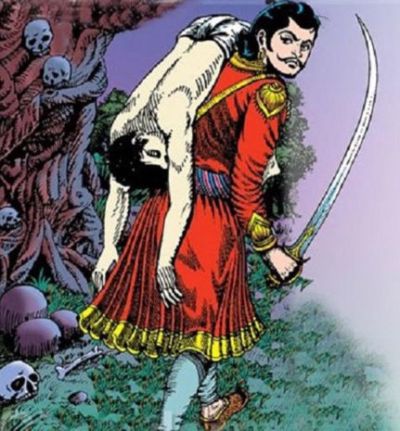Read the previous part here…
Now I have a question for you. Who deserves to marry Somaprabhā ? Who does she belong to? Tell me, o wise king. Remember, if you know the answer, and don’t tell me the truth, your head will burst into a hundred pieces!

इति वेतालतस् तस्माच् छ्रुत्वा मौनं विहाय च ।
स त्रिविक्रमसेनस् तम् उवाचैवं महीपतिः ॥ १२,१२.४७ ॥
शूराय सा प्रदातव्या येन प्राणपणोद्यमात् ।
अर्जिता बहुवीर्येण हत्वा तं युधि राक्षसम् ॥ १२,१२.४८ ॥
ज्ञानिविज्ञानिनौ त्व् अस्य धात्रा कर्मकरौ कृतौ ।
सदा गणकतक्षाणौ परोपकरणे न किम् ॥ १२,१२.४९ ॥
इत्य् उक्तं मनुजपतेर् निशम्य तस्य स्कन्धाग्रात् सपदि स पूर्ववज् जगाम ।
वेतालो निजपदम् एव सो ऽपि राजानुद्वेगः पुनर् अपि तं प्रति प्रतस्थे ॥ १२,१२.५० ॥
King Vikram replied…
“Somaprabhā should be given in marriage to Veerendra, the brave young man who fought the Rākṣasa. He risked his life and limb to rescue her. The one who was knowledgeable and the one who was talented assisted in the task, but then, are they not mere assistants? The real work was done by Veerendra, and hence she belongs to him.”
As the king uttered these words, the Vetāla flew off his shoulder, laughing. And King Vikram once more started to walk towards the banyan tree, determined to fetch him.
षष्ठो वतेालः
The sixth story
The lady who exchanged heads
ततो गत्वा पुनस् तस्मात् प्राप्य तं शिंशपातरोः ।
वेतालं प्राग्वद् आदाय स्कन्धे मौनेन भूपतिः ॥ १२,१३.१ ॥
स त्रिविक्रमसेनो ऽत्र यावद् आगच्छति द्रुतम् ।
तावत् पथि स वेतालो भूयो ऽप्य् एवम् उवाच तम् ॥ १२,१३.२ ॥
राजन् सुधीः सुसत्त्वश् च भवांस् तेन प्रियो ऽसि मे ।
अतो विनोदिनीं वच्मि कथां प्रश्नं च मे शृणु ॥ १२,१३.३ ॥
King Vikram reached the banyan tree and again grabbed the corpse, put it across his shoulders, and started to walk towards his destination.
As he walked, the Vetāla spoke once again “Oh King, you are wise, determined and brave as well. I value these qualities, and so let me entertain you with an amusing story.
आसीद् राजा यशःकेतुर् इति ख्यातो महीतले ।
तस्य शोभावती नाम राजधान्य् अभवत् पुरी ॥ १२,१३.४ ॥
तस्याम् अभून् नगर्यां च गौर्यायतनम् उत्तमम् ।
तस्य दक्षिणतश् चासीद् गौरीतीर्थाभिधं सरः ॥ १२,१३.५ ॥
तस्याषाढचतुर्दश्यां शुक्लायां प्रतिवत्सरम् ।
यात्रायां स्नातुम् एति स्म नानादिग्भ्यो महाजनः ॥ १२,१३.६ ॥
एकदा च तिथौ तस्यां स्नातुम् अत्राययौ युवा ।
रजको धवलो नाम ग्रामाद् ब्रह्मस्थलाभिधात् ॥ १२,१३.७ ॥
सो ऽपश्यद् रजकस्यात्र तीर्थे स्नानागतां सुताम् ।
कन्यां शुद्धपटाख्यस्य नाम्ना मदनसुन्दरीम् ॥ १२,१३.८ ॥
इन्दोर् लावण्यहारिण्या तया स हृतमानसः ।
अन्विष्य तन्नामकुले कामार्तो ऽथ गृहं ययौ ॥ १२,१३.९ ॥
तत्रानवस्थितस् तिष्ठन् निराहारस् तया विना ।
पृष्ठो मात्रार्तया तस्यै तच् छशंस मनोगतम् ॥ १२,१३.१० ॥
There once lived a famous king named Yaśaḥketu (the one who’s flag of fame flies high), and he ruled his kingdom from a city named Śobhāvatī. The city had a beautiful temple of Gaurī, and there was a lake named Gaurītīrtha situated south of this temple.
Every year, there was a festival held at the temple, on the fourteenth day of the Shukla Paksha of the month of Āṣāḍha.
Large crowds came there to celebrate the festival, and have a dip in the holy waters of the Gaurītīrtha.
On one such festival, a young man named Dhavala (white) came from a village named Brahmasthala, to participate in the celebration and pray to Devi Gaurī. As he was sitting on the banks of the lake one morning, he saw the beautiful daughter of a man named Śuddhapaṭa (a clean garment), a girl called Madanasundarī, who had come to bathe in the holy waters. It was love at first sight for Dhavala, and he lost his heart to that girl, whose beauty eclipsed even that of the moon.
He asked around and came to know her name and her family, and went home the next day, but his heart and his mind stayed back, and possibly left with Madanasundarī…
At home, he refused to eat, and drink, and lost all taste for everything that he used to enjoy. His mother observed his behavior and asked him what the matter was. Dhavala told her everything.
इत्य् आश्वास्य स तं पुत्रम् आहारादौ प्रवर्त्य च ।
तद्युक्तो विमलो ऽन्येद्युर् ययौ शुद्धपटास्पदम् ॥ १२,१३.१४ ॥
ययाचे चात्र पुत्रस्य तस्यार्थे धवलस्य सः ।
कन्यां तस्मात् स चास्मै तां प्रतिशुश्राव सादरम् ॥ १२,१३.१५ ॥
लग्नं निश्चित्य चान्येद्युस् तां स शुद्धपटः सुताम् ।
धवलाय ददौ तस्मै तुल्यां मदनसुन्दरीम् ॥ १२,१३.१६ ॥
कृतोद्वाहश् च स तया साकं दर्शनसक्तया ।
भार्यया स्वपितुर् गेहं जगाम धवलः कृती ॥ १२,१३.१७ ॥
सुखस्थितस्य तस्याथ कदाचिच् छ्वशुरात्मजः ।
तस्या मदनसुन्दर्या भ्राता तत्रागतो ऽभवत् ॥ १२,१३.१८ ॥
His mother approached her husband Vimala, and told him what had been bothering their son. Vimala went to him and said “Why are so worried? This will be easier than you think! Śuddhapaṭa will give his daughter in marriage to you, if I ask him to do so. “
“We are equal in wealth and stature, and we know each other very well. So don’t worry, I will arrange everything.”
So comforted, Dhavala finally had something to eat, and felt excited about the coming days…
The next day, Vimala and Dhavala set out to Śuddhapaṭa’s house. When they reached there, they were welcomed and offered food and refreshments. Vimala asked Śuddhapaṭa for his daughter’s hand in marriage for his son, and Śuddhapaṭa readily agreed.
They saw a good muhurata the next day, and the marriage was solemnized. Dhavala returned to his father’s house a happy man, his new bride in tow.
After a few months of enjoying marital bliss, one day…
to be continued…
